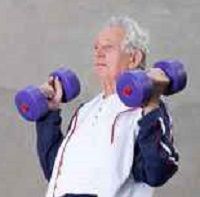Exercise Reduces Pain, Improves Musculoskeletal Outcomes in the Elderly
Study results suggest that a community-based, low-impact exercise program appears to successfully help older patients with musculoskeletal conditions living in underserved communities improve musculoskeletal outcomes and quality of life.

Study results suggest that a community-based, low-impact exercise program appears to successfully help older patients with musculoskeletal conditions living in underserved communities improve musculoskeletal outcomes and quality of life. Many participants in the program experienced decreased pain, improved mobility, and enhanced overall health.
The program was offered by the Hospital for Special Surgery in senior centers in New York City’s Chinatown, Flushing, and Queens communities as part of a study titled “The Effectiveness of a Low-Impact Exercise Program on Musculoskeletal Health of Asian Older Adults,” which was presented at the American College of Rheumatology/Association of Rheumatology Health Professionals annual meeting on November 9 in San Francisco.
“Getting seniors to be active in any way will generally improve their quality of life and help them function better in their everyday activities,” said Linda Russell, MD, a rheumatologist and chair of the Public and Patient Education Advisory Committee at the Hospital for Special Surgery, who was not involved in the study. “People believe that if you have arthritis you shouldn’t exercise, but appropriate exercises actually help decrease pain.”
Previous research has found that low-impact physical activity can improve pain, function, mood, and quality of life without worsening arthritis symptoms or disease severity for the 50% of adults aged 65 and older living with arthritis. Unfortunately, patients with arthritis are less likely to be physically active that those without the condition. Living in poverty only compounds the issues faced by those with musculoskeletal conditions, as experienced by 25% of older Asian Americans living in New York City in 2010.
“To help those in underserved communities better manage these conditions, Hospital for Special Surgery developed its Asian Community Bone Health Initiative in 2011,” said study co-author Sandra Goldsmith, senior director of Education and Academic Affairs at HSS. “The goal is to help seniors decrease musculoskeletal pain, stiffness and fatigue; improve balance; reduce falls; and increase physical activity.”
The 8-week program is led by bilingual, certified instructors and is held once weekly in community-based organizations that largely serve older Asian adults. For the study, 370 patients took part in the program between September 2011 and July 2015, 204 of whom completed surveys before and after participating in the exercise classes. The impact of the program was evaluated with a pre-post design using validated instruments to assess musculoskeletal outcomes. Muscle and joint pain intensity, as well as stiffness, were quantified with an 11-point Numeric Pain Rating Scale. The 11-point Brief Pain Inventory measured pain interference on seven daily activities. Physical function was measured with the SF-36, and self-efficacy to exercise was measured with the six-item self-efficacy scale for managing chronic disease. An 11-point Brief Fatigue Inventory measured fatigue levels. Of survey respondents, 91% were female, 75% were aged 65 to 84 years, and 88% had musculoskeletal conditions.
Participants’ muscle and join pain decreased by 32%, the average pain intensity rating was reduced from 5.6 to 44, the average fatigue level dropped from 3.9 to 2.3, average exercise confidence increased from 6.9 to 8.5, and average stiffness levels decreased from 3.8 to 2.6. Study participants also reported reductions in the average pain interference for all seven daily activities. Among other findings are the following:
- 88% more participants could climb several flights of stairs
- 69% more could lift/carry groceries
- 67% more could bend, kneel, or stoop
- 91% felt the program reduced their fatigue
- 97% felt that the program reduced their stiffness
- 95% felt their balance improved
- 96% felt more confident that exercising would not make their symptoms worse
“The study results indicate that the hospital’s Bone Health Initiative has a positive impact on the musculoskeletal health of the Asian senior population,” said lead author Huijuan Huang, MPA, Senior Program Coordinator at the Hospital for Special Surgery. “Providing free exercise programs to the community can play an important role in helping adults manage musculoskeletal conditions.”